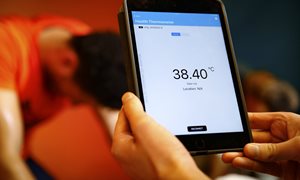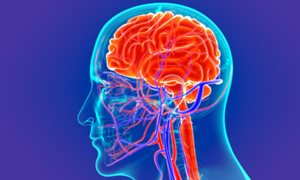
Dick Thijssen has been appointed Professor of Cardiovascular Physiology at Radboud university medical center / Radboud University, effective August 1. His field of research is the prevention of cardiovascular disease. In particular, he looks at the influence of exercise on the heart and blood vessels.
"How does exercise protect us from cardiovascular disease?" is the question that has been on Dick Thijssen's (Boxmeer, 1979) mind since 2000, when he began his studies in Biomedical Sciences in Nijmegen as a student. "We know for a long time that exercise lowers the risk of cardiovascular disease (CVD), but we still don't actually know exactly the reasons why." The interest in exercise and health goes back even further. "That's why I first completed a course in physical therapy. But I wanted the depth of research, so I decided to proceed after finishing physical therapy."
Combining Liverpool and Nijmegen
After obtaining his PhD in Nijmegen in 2007 (title of thesis: The role of endothelin-1 in the regulation of vascular tone in deconditioning and aging), Thijssen obtained a Rubicon grant to work as a postdoc in Liverpool, at John Moores University, arguably the best place for researchers interested in the role of exercise on our health. "The facilities there for sports research are second to none. It's huge, several tests can be administered at the same time. And they are also advanced in terms of technology." It was here that he took his first steps in examining the role that exercise and exertion play in reducing the risk of CVD. He became Professor of Cardiovascular Physiology and Exercise in Liverpool, splitting his time between Nijmegen and Liverpool. "Until the outbreak of COVID-19, I split my time 50/50. In the last 1.5 years, the focus has been more on Nijmegen, and will continue to be."
Cardiovascular disease prevention
Thijssen wants a better understanding of the mechanisms on the impact of exercise on blood vessels, because better understanding of the underlying mechanisms leads to better treatments and interventions. "How great should the exertion be? We see, for example, that single bouts of exercise already has protective effects. What are the mechanisms underlying these effects, what do we learn from them, and how do these effects relate to more intensive or regular exercise training?"
Here, he focuses on both the prevention of cardiovascular disease, including promoting a healthy lifestyle, and the prevention of clinical complications in CVD patients. For example, he studied the impact of so-called high intensity training in the rehabilitation of CVD patients. Partly due to his research, these modes of exercise have now been widely implemented in cardiac rehabilitation. Thijssen: "But we also study the best way to prepare someone for surgery. The better the blood vessels, the better someone will recover."
Is sitting the new smoking?
Another type of study Thijssen will conduct in the coming years focuses on sitting behaviour. He nuances the comment that sitting is the new smoking. "One hour of sitting is not necessarily bad, but one cigarette is," he explains. Still, we need to interrupt this sitting regularly, he says. "We know that sitting less lowers the risk of cardiovascular disease, but again, the question is: what are the mechanisms that make sitting bad for our health? Only when we know that, can we develop targeted interventions."
In this regard, the patient and his/her motivation is crucial to basically all of Thijssen's research: "I collaborate significantly with people in the clinic, especially with the Department of Cardiology. Including patients in developing our ideas, whether it's about sitting or about exercise in general, has important benefits for research. Every patient (group) has their own challenges and bumps. We can come up with a perfect plan on paper, but if the patient doesn't adopt the strategy, it's not a perfect plan."
Prof. Dr. D.H.J. Thijssen to Professor of 'Cardiovascular Physiology' appointment August 1, 2021, for 5 years.
-
Want to know more about these subjects? Click on the buttons below for more news.
More information
Pauline Dekhuijzen

wetenschaps- en persvoorlichter
Related news items

Your heart rate as a thermometer Research Olympic athletes will be followed up during 4Daagse
18 July 2022Body temperature can be determined from heart rate. This is what research by the Radboudumc among Olympic athletes shows. Athletes can use this method during training to eventually perform better in the heat. The technique is now being further investigated among participants in the 4Daagse.
read more.aspx?width=3749&height=3370&ext=.jpg&type=BlockColumn1Zoom1)
Do insects help 4Days walkers to recover? a Radboudumc study
7 July 2022During the first 4Daagse since 2019, Radboudumc is investigating whether walkers will benefit from grounded protein-rich insects. It is known that animal proteins contribute to recovery after exercise, but the researchers want to find out whether proteins from insects can do this just as well.
read more
Exercise program appears to be a good alternative to surgery for chronic chest pain Reduced risk of other conditions, hospitalizations, and mortality
9 December 2021 Patients with chronic chest pain may benefit more from following an exercise program than from surgery in which doctors place a stent. Data from over 18,000 patients show a reduced risk of mortality, hospitalizations and other conditions. read more
How much should we exercise to live healthier lives? Research into the relationship between exercise, heart disease and mortality
3 December 2021 It has long been known that exercise reduces the risk of many chronic diseases. However, we do not yet know exactly how much exercise is necessary to achieve health benefits. read more

